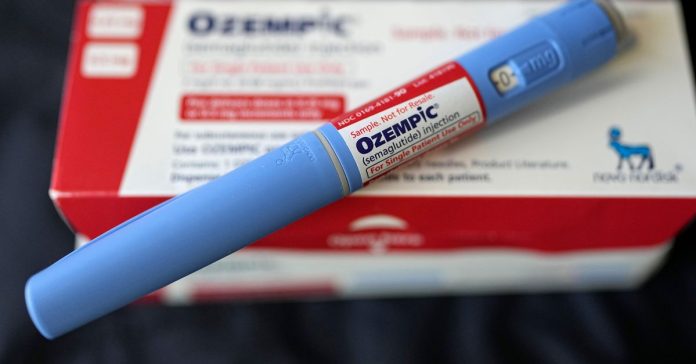
The injectable drug Ozempic is shown Saturday, July 1, 2023, in Houston. (AP Photo/David J. Phillip, File)
A series of hefty lawsuits are barreling ahead throughout the United States from a wide array of people who claim Novo Nordisk and Eli Lily, makers of diabetes and weight loss drugs like Ozempic, Wegovy and others, failed to warn them about potentially dangerous side effects and risks including stomach paralysis and damage to the gallbladder so severe it would require removal in some instances.
So numerous are these and similar allegations coming in from users of the injectable drugs known as “GLP-1 agonists” in states like Arizona, Illinois, North Carolina, Texas and elsewhere, that a multidistrict litigation proceeding before a federal judge in the Pennsylvania only last week opted to centralize the cases as they proceed.
Novo Nordisk said in a statement to Law&Crime via email on Friday that the lawsuits “are without merit” and the company intends to “vigorously defend against these claims,” though it was pleased with the decision to coordinate all of the litigation before U.S. District Judge Gene E.K. Pratter. Pratter was appointed by former President George W. Bush.
“Patient safety is our top priority at Novo Nordisk and we work closely with the U.S. Food and Drug Administration to continuously monitor the safety profile of our medicines,” a spokesperson for Novo Nordisk said. “GLP-1 medicines have been used to treat type 2 diabetes (T2D) for more than 18 years, and for the treatment of obesity for 8 years. This includes Novo Nordisk GLP-1 products such as semaglutide and liraglutide that have been on the market for more than 13 years. Semaglutide has been extensively examined in robust clinical development programs, large real world evidence studies and has cumulatively over 9.5 million patient years of exposure. The known risks and benefits of semaglutide and liraglutide medicines are described in their FDA-approved product labeling. Novo Nordisk stands behind the safety and efficacy of all of our GLP-1 medicines when they are used as indicated and when they are taken under the care of a licensed healthcare professional.”
But according to the details of a lawsuit filed by some 30 plaintiffs alone against the drugmakers, the companies did not properly disclose gastrointestinal risks including something known as “gastroparesis” or stomach paralysis.
Instead, “the label discloses delayed gastric emptying in the ‘Drug Interaction’ section and notes that Ozempic ‘may impact absorption of concomitantly administered oral medications,” the 253-page amended complaint states. “Similarly, in the ‘Mechanism of Action’ section, the label minimizes gastrointestinal risks by stating that ‘[t]he mechanism of blood glucose lowering also involves a minor delay in gastric emptying in the early postprandial phase.””
“These statements only describe the drug’s mechanism of action and do not disclose gastroparesis as a risk of taking Ozempic, nor do they disclose gastroparesis as a chronic condition that can result as a consequence of taking Ozempic,” the plaintiffs’ attorney, Anthony G. Simon, wrote in a Mar. 8 complaint.
In a report by USA Today, plaintiff Paulsen Bronston, a diabetic man who lives in Arizona, said that after he started taking Ozempic — under his doctor’s care — he started experiencing extreme diarrhea at first.
His condition only worsened and he told the outlet his eyes became yellow and he ended up in the hospital to have his gallbladder removed. Other plaintiffs say they experienced severe distress and permanent injuries after taking the drugs. Many claim they have incurred huge medical expenses as a result. Though some injuries have been permanent, others have not.
The cases before Pratter alone involve allegations from no less than 50 people and as USA Today reported, a tidal wave of other complaints are expected to come in the weeks and months ahead as the drugs continue to soar in popularity. One attorney with offices in California and Montana has said he currently represents 2,000 people complaining of unforeseen side effects from the drug.
Novo Nordisk makes Ozempic, Wegovy and Rybelsus; others who have sued allege issues with Eli Lily’s iteration of the diabetes and weight loss drugs, Trulicity and Mounajro.
A spokesperson for Eli Lily did not immediately return a request for comment.
Have a tip we should know? [email protected]

